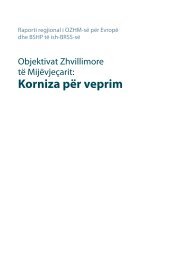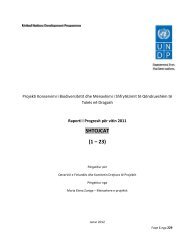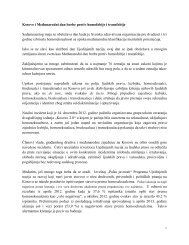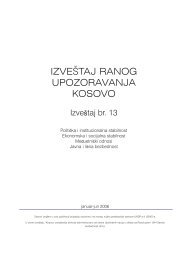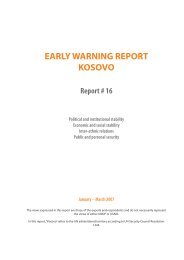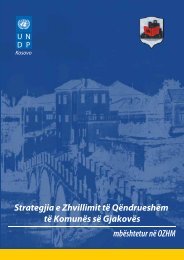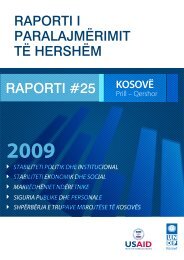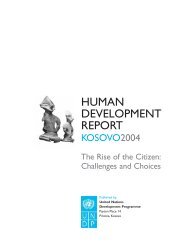Kosovo Human Development Report 2010 - UNDP Kosovo - United ...
Kosovo Human Development Report 2010 - UNDP Kosovo - United ...
Kosovo Human Development Report 2010 - UNDP Kosovo - United ...
You also want an ePaper? Increase the reach of your titles
YUMPU automatically turns print PDFs into web optimized ePapers that Google loves.
outreach to parents and families to<br />
improve the prioritization of education<br />
among the excluded.<br />
• Institutionalize gender balanced<br />
public consultations at both central<br />
and local levels: <strong>Kosovo</strong> requires<br />
an institutionalized rather<br />
than ad hoc public consultation<br />
mechanism to ensure that the<br />
voices of excluded groups can be<br />
heard during policy formulation,<br />
and feedback provided to groups<br />
once policies are developed. Particular<br />
care must be taken to ensure<br />
that both women and men<br />
are consulted from among vulnerable<br />
groups, as their issues and<br />
concerns will differ. Consultations,<br />
especially with socially excluded<br />
groups, may help to identify priorities<br />
for interventions, create<br />
consensus, explore ideas, improve<br />
acceptance of new proposals, find<br />
cost-efficient policy solutions and<br />
increase transparency in decisionmaking<br />
and service delivery. Local<br />
consultation mechanisms should<br />
also be established to target social<br />
assistance more effectively and activate<br />
people experiencing social<br />
exclusion. In order to mobilize their<br />
potential to link communities and<br />
authorities, NGOs require national<br />
support to move them from reliance<br />
on external funding to a more<br />
sustainable source based on their<br />
value to governance and communities.<br />
• Launch a <strong>Kosovo</strong>-wide campaign<br />
to promote social cohesion: <strong>Kosovo</strong><br />
needs to address its deepest social<br />
fractures before social inclusion<br />
policies can take root. This can only<br />
be achieved by increasing public<br />
awareness of the high socio-economic<br />
cost of discrimination, providing<br />
opportunities for inter-community<br />
dialogue and fostering mutual<br />
engagement in the civic participation<br />
process by excluded groups on<br />
the one hand and political powerholders<br />
on the other. Such an extensive<br />
programme would necessarily<br />
have to be developed and funded at<br />
the central level, by the <strong>Kosovo</strong> coordination<br />
mechanism for social inclusion;<br />
however, it must also be tailored<br />
to individual municipal needs<br />
and included in municipal budgets.<br />
Three critical areas for social intervention<br />
include gender equity in the<br />
socio-economic and political sphere,<br />
rigid inter-ethnic tensions between<br />
<strong>Kosovo</strong>-Albanians and <strong>Kosovo</strong>-Serbs<br />
(including the security of returnees)<br />
and integration of discriminated<br />
<strong>Kosovo</strong>-RAE communities. Since a<br />
great deal of legislation already exists<br />
on all of these issues, a coordinated<br />
strategy should focus instead on selecting<br />
priority areas for action (both<br />
issue-based and geographical), allocating<br />
financing and developing<br />
indicators to measure shifts in public<br />
perception and social alliances for<br />
development.<br />
• Expand the labour market, with<br />
a focus on rural transformation:<br />
since inclusive employment links<br />
closely to social cohesion and selfreliance,<br />
<strong>Kosovo</strong> cannot afford to<br />
wait for macro-economic changes<br />
to expand its labour market. In<br />
the interim, <strong>Kosovo</strong> must accelerate<br />
reforms to its business climate<br />
to allow SMEs to flourish, particularly<br />
in communities with very low<br />
employment rates and high disparities<br />
in employment between<br />
ethnic groups. A job-seeker initiative<br />
is urgently needed to direct<br />
young jobseekers and the recently<br />
unemployed towards work-readiness<br />
training and potential new<br />
job opportunities. Public-private<br />
partnerships would be essential<br />
FINDINGS AND RECOMMENDATIONS | 99



